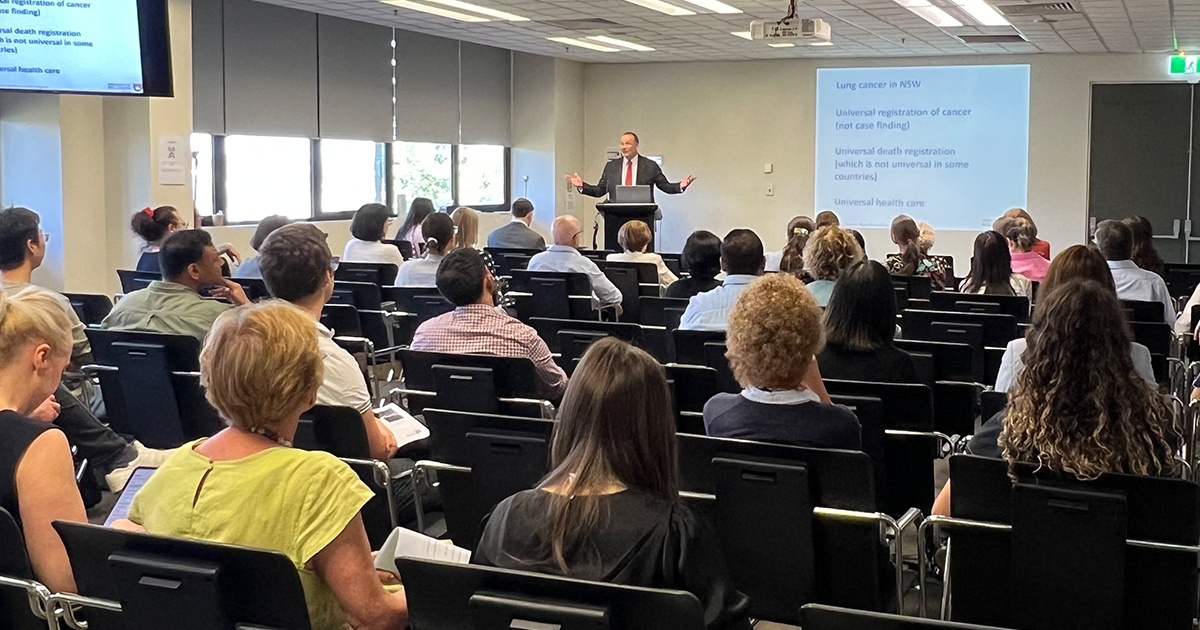The Woolcock Institute of Medical Research

The health benefits of 'Big Data'
Professor David Currow has spent his career using numbers to study symptom control, the population burden of symptoms and health services. He has a very strong sense of what numbers mean when it comes to population health and, especially, cancer.
“We need to always remember that when we look at the numbers, these are people. In terms of lung cancer, we know that survival rates in Canada have been up to three percent higher than Australia over decades. Three percent is a lot of people drinking bubbles on New Year’s Eve. The numbers tell us very clearly that we can and, we know, we must do better.”
Professor Currow spoke at the 2023 Lung Cancer Symposium hosted by the Woolcock Institute of Medical Research on 10 November. He drew on the “Reporting for Better Cancer Outcomes 2022” program by the Cancer Institute NSW to show just how powerful population data collection can be as a tool to improve clinical outcomes. We can learn from countries that do better and from those who are not doing as well, he says.
Striving for Good, Better, Best
The numbers show that lung cancer mortality rates are far higher than any other cancer (20% compared to colon cancer which comes in second at 8%). They also show that outcomes have improved for those with all solid tumours in the past 20 years and that Australians have some of the best cancer outcomes in the world.
But, that still leaves room to do things better.
And, there is what Professor Currow refers to as “a postcode lottery” between Local Health Districts when it comes to variations in treatments and outcomes that is simply unacceptable.
“We have variations in outcomes for people with lung cancer of about 50 percent depending on where you live. We have to work hard to get rid of that,” he says.
There are also large variations in the utilisation of radiotherapy and surgery for lung cancer which are not explained by either the patient population or the resources available. Professor Currow’s team calculated that the number of people in NSW who could potentially benefit from surgery for localised small cell lung cancer – but are not getting it – is about 120-130 per year.
“These people may not be going to their GP, they may not be getting referred on by their GP to a specialist, or not being referred by their specialist to a multi-disciplinary cancer care team. There are several steps in the process. Ultimately, though, this is avoidable mortality for a significant proportion of these people. When you project that across years, you start to get some very frightening numbers.”
Finding A Way Through Numbers
The numbers also provide a beacon for researchers, says Professor Currow. Data can highlight a trend but it’s up to researchers to take an association from linked data and prove cause and effect through prospective, controlled studies.
A case in point is data collected from the more than 172,000 people in NSW who received a cancer diagnosis between 2013 and 2016. It shows clearly those who took antibiotics in the six months prior to chemotherapy, didn’t do as well and the closer to therapy, the worse they did.
“When it comes to lung cancer,” he asked researchers at the Symposium, “how many people are prescribed three courses of antibiotics before anyone puts a stethoscope on their chest, let alone does a chest x-ray or CT scan?”
Professor Currow says there’s also an association between better outcomes in lung cancer (and other cancers) and taking tetracyclines during treatment.
“The challenge is what we do to follow on from what the numbers tell us. Data can provide insights which are hypothesis-generating. It is up to researchers to take that into the lab and, hopefully find a way forward when it comes to cancer.”
Professor David Currow is the Deputy Vice-Chancellor at the University of Wollongong. He is the former Chief Cancer Officer, NSW and the Chief Executive Officer of the Cancer Institute, NSW, the State’s cancer control agency.
Find out more
- About our Centre for Lung Cancer Research
- Support our lung cancer research with a tax-deductible donation










